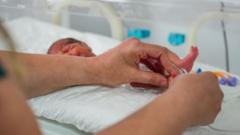In Turkey, a significant trial began involving 47 medical professionals, including doctors, nurses, and ambulance drivers, accused of orchestrating a scheme that led to the deaths of at least ten newborns. Prosecutors allege that the medics were part of a fraudulent operation that involved transferring infants between hospitals for profit, primarily targeting private medical facilities.
The indictment, which spans 1,400 pages, claims that the defendants falsified medical diagnoses in order to justify transferring babies to 19 private hospitals. Once admitted to these facilities, the infants were reportedly subjected to extensive and often unnecessary treatments while the medical staff profited through shared social security payments for each day a baby remained in intensive care.
Amidst the serious allegations, the defendants have steadfastly maintained that their intentions were purely to provide the best possible care for the infants. Dr. Firat Sari, one of the accused, emphasized to prosecutors that all actions taken were in line with established procedures and protocols.
The case has prompted not just legal action, but public outrage as well. As the trial commenced, protesters gathered outside the courthouse near Istanbul, demanding accountability for what they termed ''baby killers'' and calling for the closure of the implicated private hospitals. Police initiated an inquiry following an anonymous tip-off in March 2023, leading to the revocation of licenses for ten hospitals implicated in the scandal.
If convicted, the defendants could face serious consequences, including lengthy prison sentences for charges ranging from "homicide through negligence" to fraud and forgery. The sensational nature of the case continues to stir emotions and debate within the Turkish public and healthcare sector.
The indictment, which spans 1,400 pages, claims that the defendants falsified medical diagnoses in order to justify transferring babies to 19 private hospitals. Once admitted to these facilities, the infants were reportedly subjected to extensive and often unnecessary treatments while the medical staff profited through shared social security payments for each day a baby remained in intensive care.
Amidst the serious allegations, the defendants have steadfastly maintained that their intentions were purely to provide the best possible care for the infants. Dr. Firat Sari, one of the accused, emphasized to prosecutors that all actions taken were in line with established procedures and protocols.
The case has prompted not just legal action, but public outrage as well. As the trial commenced, protesters gathered outside the courthouse near Istanbul, demanding accountability for what they termed ''baby killers'' and calling for the closure of the implicated private hospitals. Police initiated an inquiry following an anonymous tip-off in March 2023, leading to the revocation of licenses for ten hospitals implicated in the scandal.
If convicted, the defendants could face serious consequences, including lengthy prison sentences for charges ranging from "homicide through negligence" to fraud and forgery. The sensational nature of the case continues to stir emotions and debate within the Turkish public and healthcare sector.


















